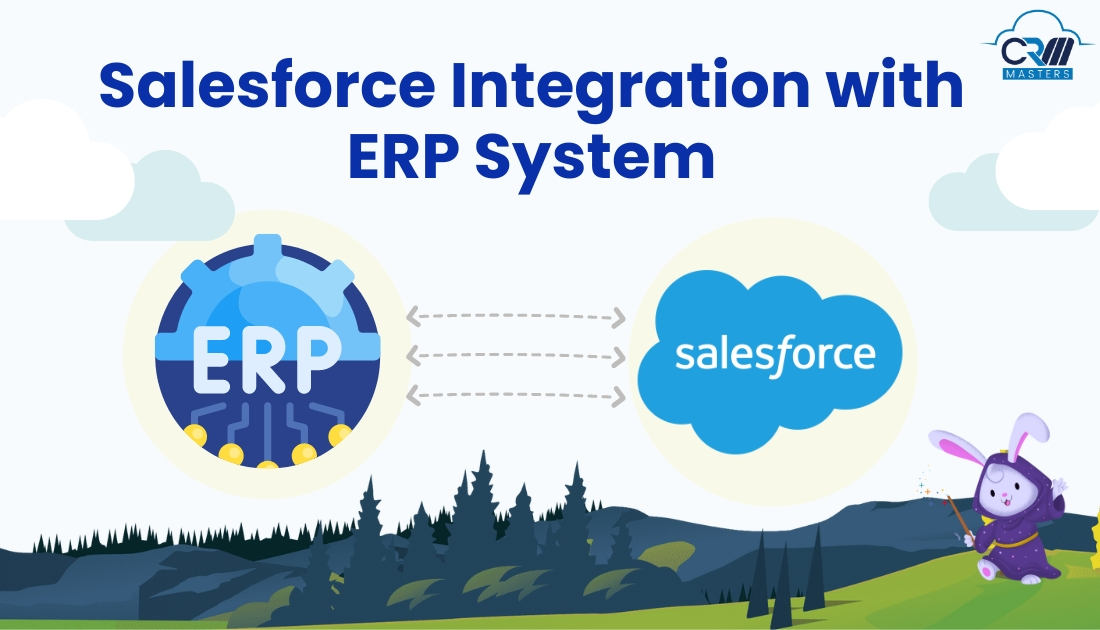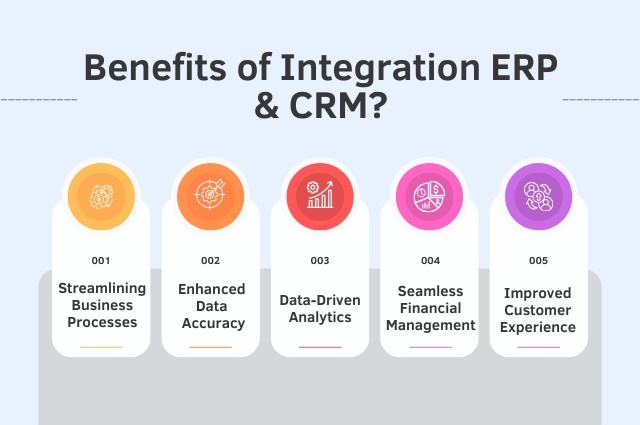
What are the Benefits of Salesforce Integration with ERP System?
Businesses are constantly seeking ways to streamline their operations, enhance efficiency, and improve customer satisfaction. The integration of Salesforce, a leading customer relationship management (CRM) platform, with Enterprise Resource Planning (ERP) systems has emerged as a strategic move for businesses looking to achieve seamless synergy between their front-end and back-end processes.
This blog will help you understand the benefits of Salesforce integration with ERP, examining how this powerful alliance can propel businesses toward enhanced productivity, data accuracy, and overall success.
Is Salesforce An ERP?
Salesforce is not an ERP system. There are a variety of Salesforce products that can be integrated with your ERP to enhance and support it, but it does not provide an ERP as a standalone solution.
Salesforce, renowned for its robust CRM capabilities, focuses on managing customer relationships, sales, and marketing activities. On the other hand, ERP systems serve as the backbone of an organization, handling various functionalities like finance, human resources, inventory, and supply chain management.
By integrating these two systems into one, businesses can create an ecosystem where data will flow seamlessly between different departments, allowing businesses to approach operations completely, and manage a more effective overall business strategy.
Benefits of Integration ERP & Salesforce CRM?

1) Streamlining Business Processes
One of the primary benefits of integrating Salesforce with ERP is the streamlining of business processes. This synergy results in a more efficient and responsive business environment, allowing teams to collaborate seamlessly and make informed decisions based on accurate and up-to-date information.
Low Data Loss Risk: Breaking down departmental barriers and ensuring that information flows seamlessly across all aspects of the organization.
Synchronized Workflow: Creating a unified environment where different teams can collaborate effortlessly, leading to a smoother and more efficient business process.
Seamless Communication: Enhancing communication channels between departments, fostering collaboration and information exchange.
Informed Decision-Making: Providing teams with real-time, accurate data to make informed decisions, ultimately improving overall organizational decision-making.
2) Enhanced Data Accuracy
Data integrity is a critical aspect of any successful business operation. The integration of Salesforce and ERP systems ensures a single source of truth for data, reducing the risk of errors associated with manual data entry and disparate systems.
Minimization of Errors: Reducing the risk of inaccuracies by eliminating the need for duplicate data entry or manual transfers.
Reduction of Manual Data Entry: Automating data transfer processes to minimize human errors and ensure data accuracy.
Accurate Reporting: Ensuring that reports generated from integrated systems reflect the most up-to-date and accurate information.
Consistency Across the Organization: Establishing a consistent and reliable data foundation across all departments.
3) Improved Customer Experience
Salesforce integration with ERP systems empowers businesses to gain a 360-degree view of their customers. By combining customer data from Salesforce with order history, invoicing, and service records from the ERP system, businesses can deliver a more personalized and responsive customer experience.
Integration of Customer Data: Consolidating customer information from various sources, providing a complete view for better understanding and engagement.
Personalized Experiences: Using integrated data to customize services, offerings, and communications to individual customer preferences.
Faster Response Times: Responding promptly to customer queries by having real-time access to relevant data.
Enhanced Customer Satisfaction: Meeting customer expectations and enhancing their overall experience with efficient query resolution.
4) Efficient Order and Inventory Management
For businesses involved in manufacturing, distribution, or retail, the integration of Salesforce with ERP brings significant benefits to order and inventory management.
Accurate Order Promises: Providing customers with reliable delivery timelines based on real-time inventory levels.
Optimal Inventory Levels: Ensuring that inventory is maintained at optimal levels to meet demand without excess or shortages.
Error Reduction: Minimizing errors associated with manual order processing, leading to a more efficient and reliable order fulfillment process.
Supply Chain Optimization: Optimizing the supply chain by automating processes and responding dynamically to changes in demand.
Also Read: ERP vs CRM: Comparison & Benefits
5) Seamless Financial Management
Integrating Salesforce with ERP enhances financial visibility and control. Businesses can effortlessly synchronize sales data with financial systems to streamline processes, providing finance teams with the tools they need to make strategic decisions based on real-time data.
Accurate Financial Reporting: Ensuring financial reports are based on the most recent and accurate sales data.
Real-time Financial Visibility: Providing financial teams with real-time insights into the company’s financial health.
Improved Revenue Recognition: Enhancing the accuracy of recognizing revenue by integrating sales and financial data.
Enhanced Financial Analysis: Facilitating more in-depth financial analysis and strategic planning based on integrated financial and sales information.
6) Data-Driven Analytics
By combining customer data from Salesforce with operational data from ERP systems, organizations can gain deeper insights into their business performance.
Combined Customer and Operational Data: Merging customer-centric data from Salesforce with operational information from ERP systems creates a comprehensive dataset that provides a complete view of business operations.
Identification of Trends and Patterns: Analyzing integrated data allows organizations to identify trends, patterns, and connections that might go unnoticed.
Informed Decision-Making: Leveraging advanced analytics tools on the integrated dataset empowers organizations to make informed, data-driven decisions.
Long-term Strategic Planning: The ability to forecast future demand and identify strategic opportunities enables businesses to plan for the long term, and manage growth and success.
7) Increased Productivity and Efficiency
A platform created by integrating Salesforce with ERP systems eliminates the need for manual data transfers and duplicate data entry making the organization more agile and responsive to market changes.
Employee Focus on Strategic Tasks: By removing the need for manual data handling, employees can redirect their efforts towards more strategic and value-added tasks, contributing to increased productivity.
Enhanced Productivity: Automating routine tasks, such as data entry and transfers, streamlines processes, reducing the time and effort required for day-to-day operations.
Improved Agility: Increased productivity across departments enhances the organization’s agility, enabling quicker responses to market changes and emerging opportunities.
8) Scalability and Future-Readiness
As businesses evolve and grow, the ability to scale operations becomes crucial. The integration of Salesforce with ERP systems provides a scalable foundation that can adapt to the changing needs of the organization.
Ability to Scale Operations: The integrated platform allows businesses to scale operations seamlessly, accommodating growth and changing business requirements.
Incorporation of New Technologies: Being future-ready means organizations can easily incorporate emerging technologies into their integrated system, staying ahead in a rapidly evolving business landscape.
Expansion of Offerings: Integrated systems support the expansion of product or service offerings without the constraints of disjointed systems, managing diversified revenue streams.
Integrate Salesforce & ERP System With Us!
Salesforce ERP integration represents a strategic initiative that holds the potential to transform your business operations.
However, this journey is not without its challenges, spanning concerns about data consistency, cost considerations, and technical complexities. Navigating these challenges successfully requires selecting the right Salesforce Implementation Partner.
Ready to propel your business to new heights through Salesforce-ERP integration? Reach out to CRM Masters, a Salesforce Consulting Partner with expertise and a proven track record.
Contact us today!












